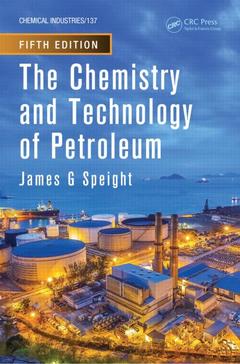Description
The Chemistry and Technology of Petroleum (5th Ed.)
Chemical Industries Series
Language: English
Subject for The Chemistry and Technology of Petroleum:
Keywords
Asphaltene Constituents; Natural Gas; Heavier Feedstocks; Asphaltene Fraction; Refining; OSHA Technical Manual; Refinery feedstock; Tar Sand Bitumen; Petrochemical intermediate; Crude Oil; thermal cracking; Catalytic Cracking; Deasphalted Oils; hydrotreating; Vacuum Residuum; desulfurization; Gas Oil; CH CH CH CH CH; Hydrogen Sulfide; Solubility Parameter; Health Administration; Heavy Oil; Octane Number; Polynuclear Aromatic Systems; API Gravity; Polynuclear Aromatic Hydrocarbons; CH CH CH CH; Reservoir Rock; Pour Point; Lubricating Oil; Diesel Fuel
· 17.8x25.4 cm · Hardback
Description
/li>Contents
/li>Readership
/li>Biography
/li>
With demand for petroleum products increasing worldwide, there is a tendency for existing refineries to seek new approaches to optimize efficiency and throughput. In addition, changes in product specifications due to environmental regulations greatly influence the development of petroleum refining technologies. These factors underlie the need for this fifth edition of The Chemistry and Technology of Petroleum, which continues in the tradition of the bestselling fourth edition, proving readers with a detailed overview of the chemistry and technology of petroleum as it evolves into the twenty-first century.
The new edition has been updated with the latest developments in the refining industry, including new processes as well as updates on evolving processes and various environmental regulations. The book covers issues related to economics and future refineries, examines the changing character of refinery feedstock, and offers new discussions on environmental aspects of refining. It contains more than 300 figures and tables, including chemical structures and process flow sheets.
A useful reference for scientists and engineers in the petroleum industry as well as in the catalyst manufacturing industry, this book introduces readers to the science and technology of petroleum, beginning with its formation in the ground and culminating in the production of a wide variety of products and petrochemical intermediates.
Part I History, Occurrence, and Recovery. History and Terminology. Classification. Origin and Occurrence. Reservoirs and Reservoir Fluids. Kerogen. Exploration, Recovery, and Transportation. Recovery of Heavy Oil and Tar Sand Bitumen. Part II Composition and Properties. Chemical Composition. Fractional Composition. Petroleum Analysis. Structural Group Analysis. Asphaltene Constituents. Structure of Petroleum. Instability and Incompatibility. Part III Refining. Introduction to Refining Processes. Refining Chemistry. Distillation. Thermal Cracking. Catalytic Cracking. Solvent Processes. Hydrotreating and Desulfurization. Hydrocracking. Hydrogen Production. Product Improvement and Treating. Gas Processing. Petroleum Products. Petrochemicals. Part IV Environmental Issues. Refinery Wastes. Environmental Aspects of Refining. Environmental Analysis. Conversion Factors. Glossary. Index.
James G. Speight earned a BSc and a PhD in chemistry from the University of Manchester, England. Since 1998, he has been employed at CD&W Inc. as a consultant/author/lecturer on energy and environmental issues. Dr. Speight has more than 40 years of experience in areas associated with the properties and recovery of reservoir fluids. His work has also focused on the environmental effects and remediation technologies related to fossil fuel and synthetic fuel processing. Dr. Speight is the author of more than 400 publications, reports, and presentations and has taught more than 70 courses. He is the author and coauthor of more than 50 books and bibliographies related to fossil fuels, synthetic fuels, biofuels, fuel processing, and environmental issues. He is also the recipient of several awards.
These books may interest you

Handbook of Petroleum Refining 56.31 €



